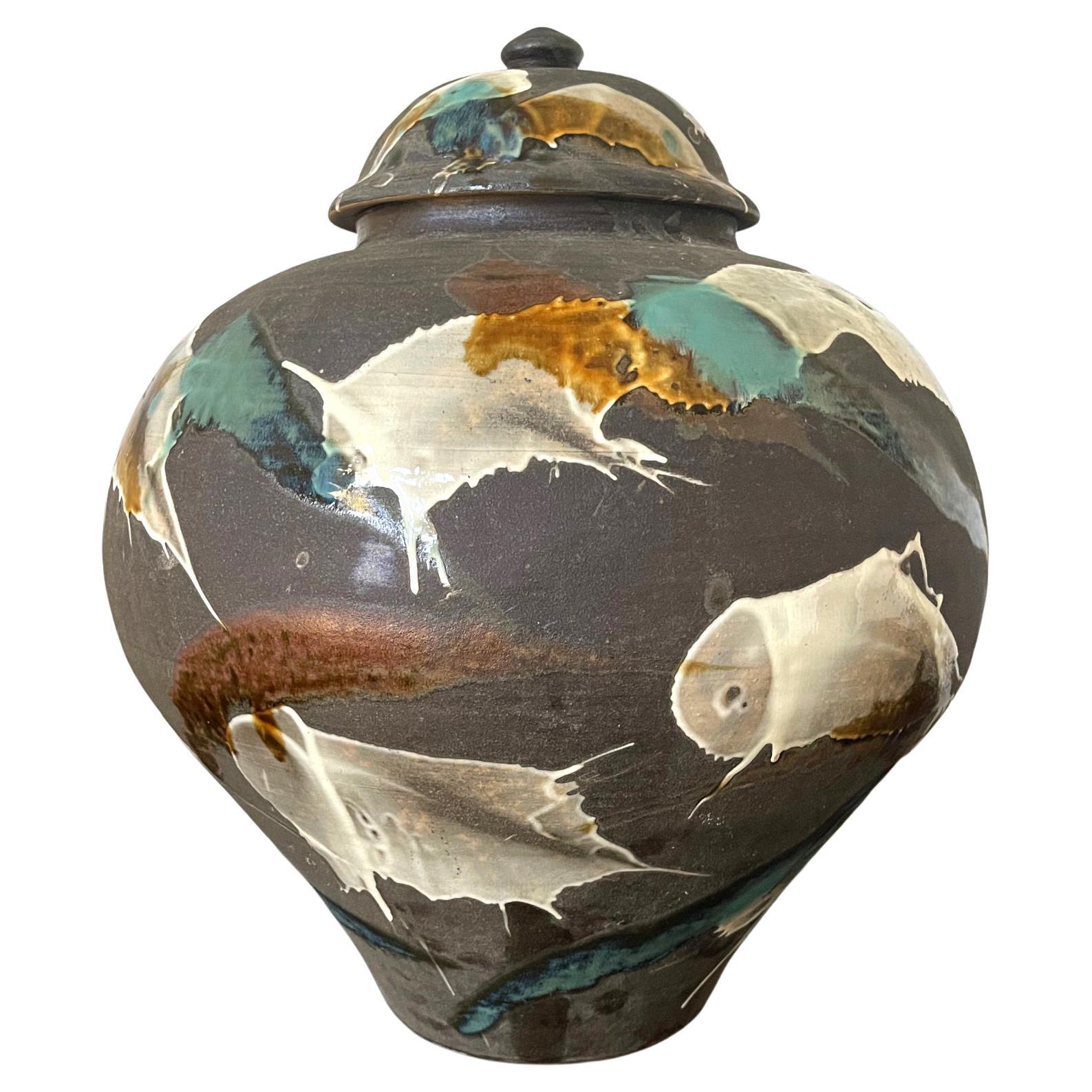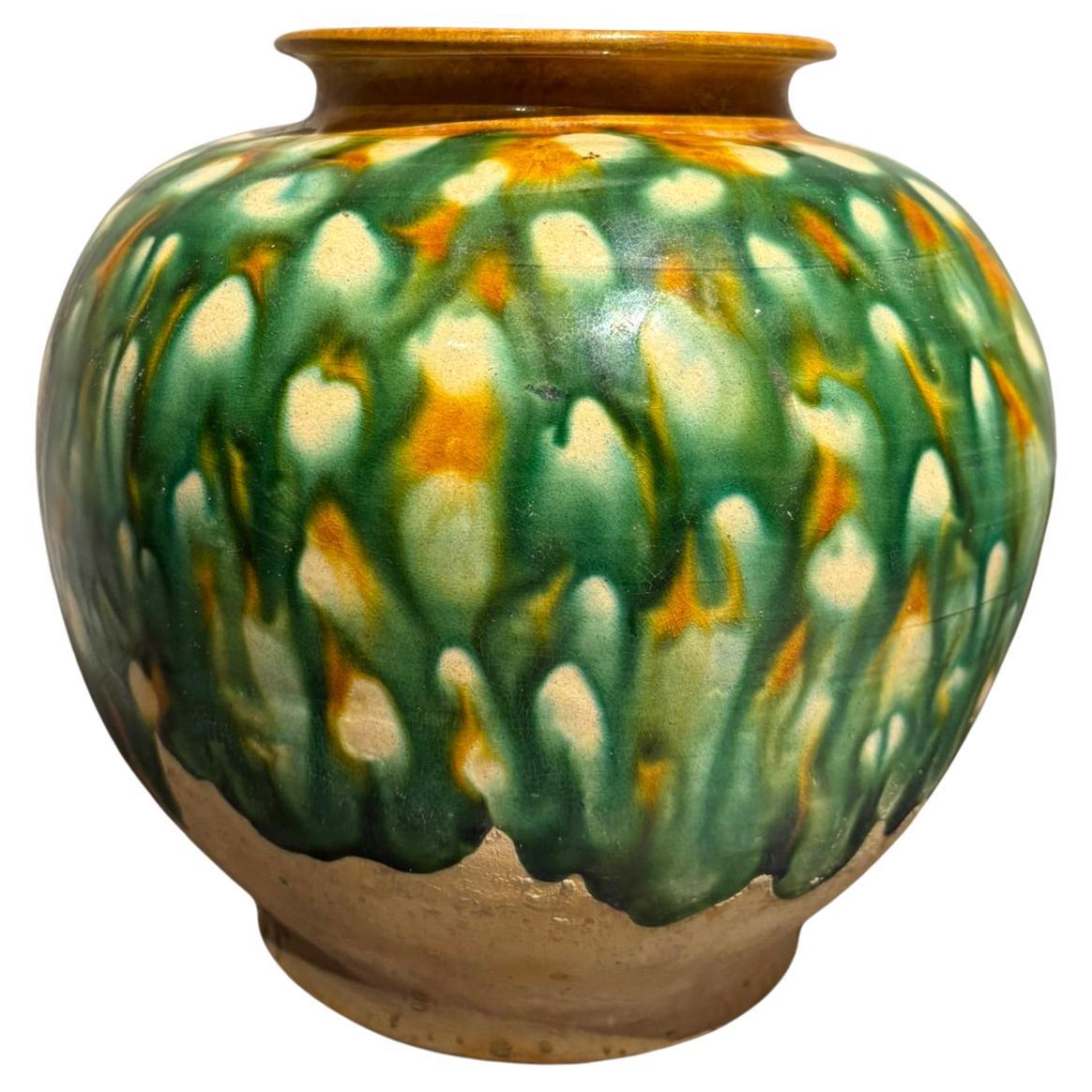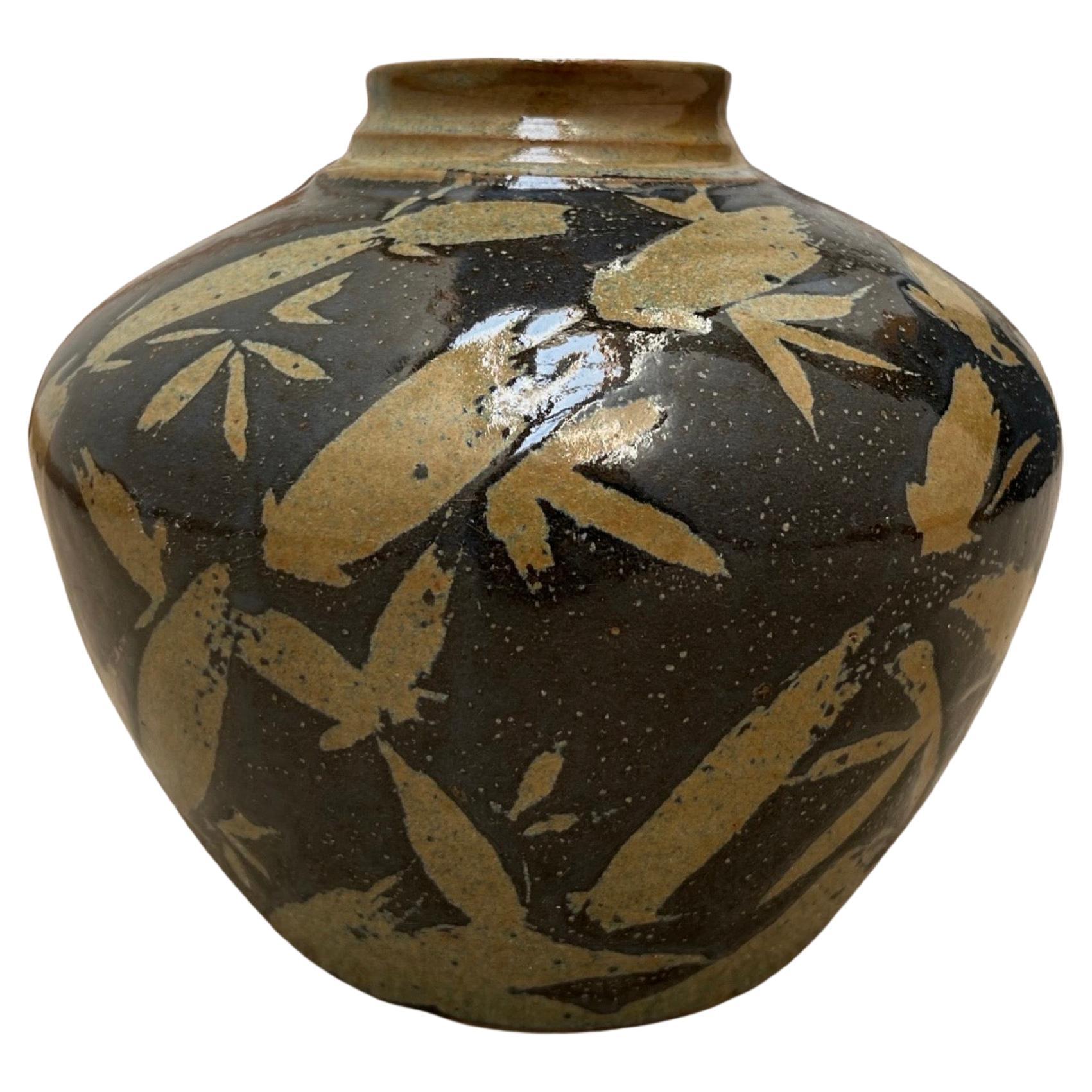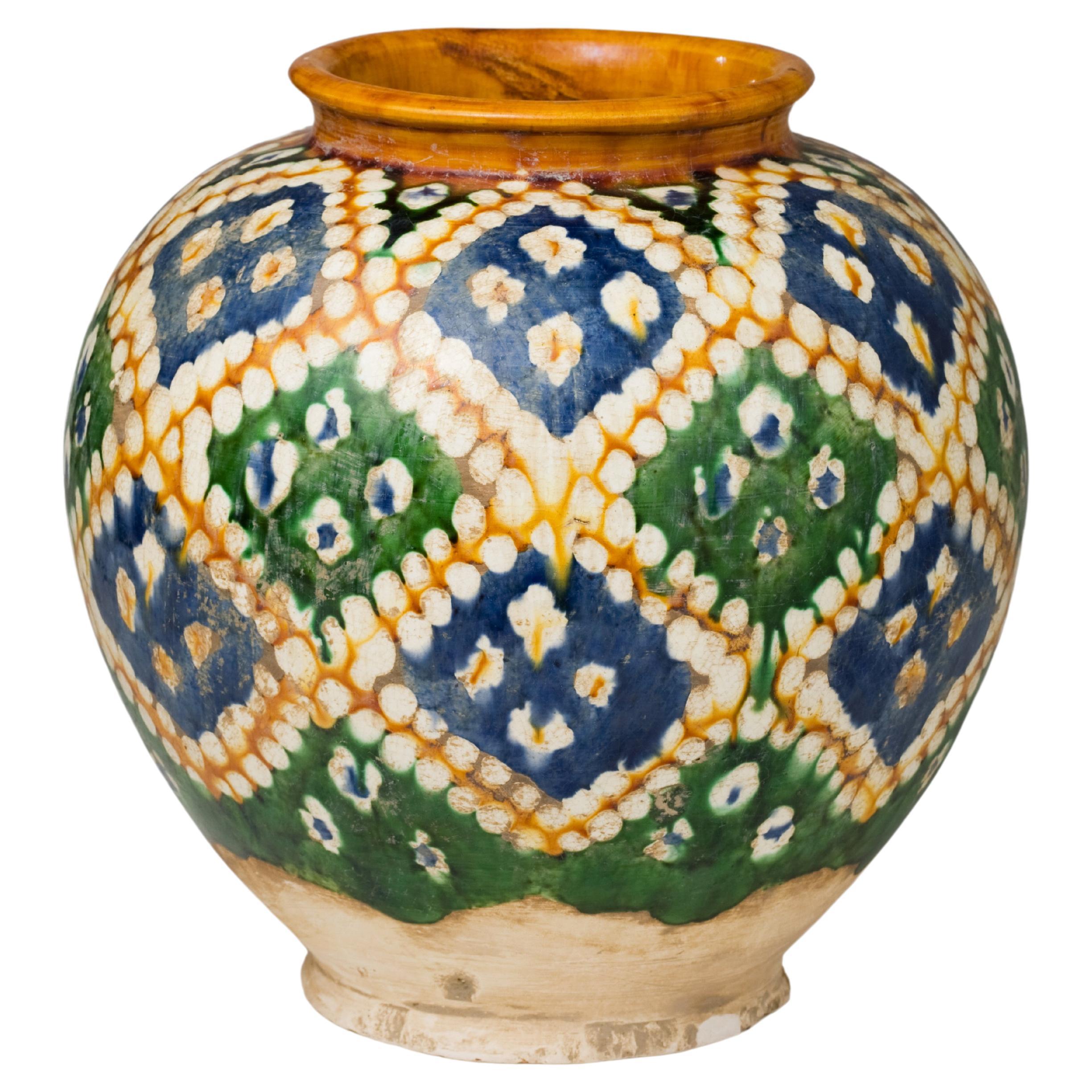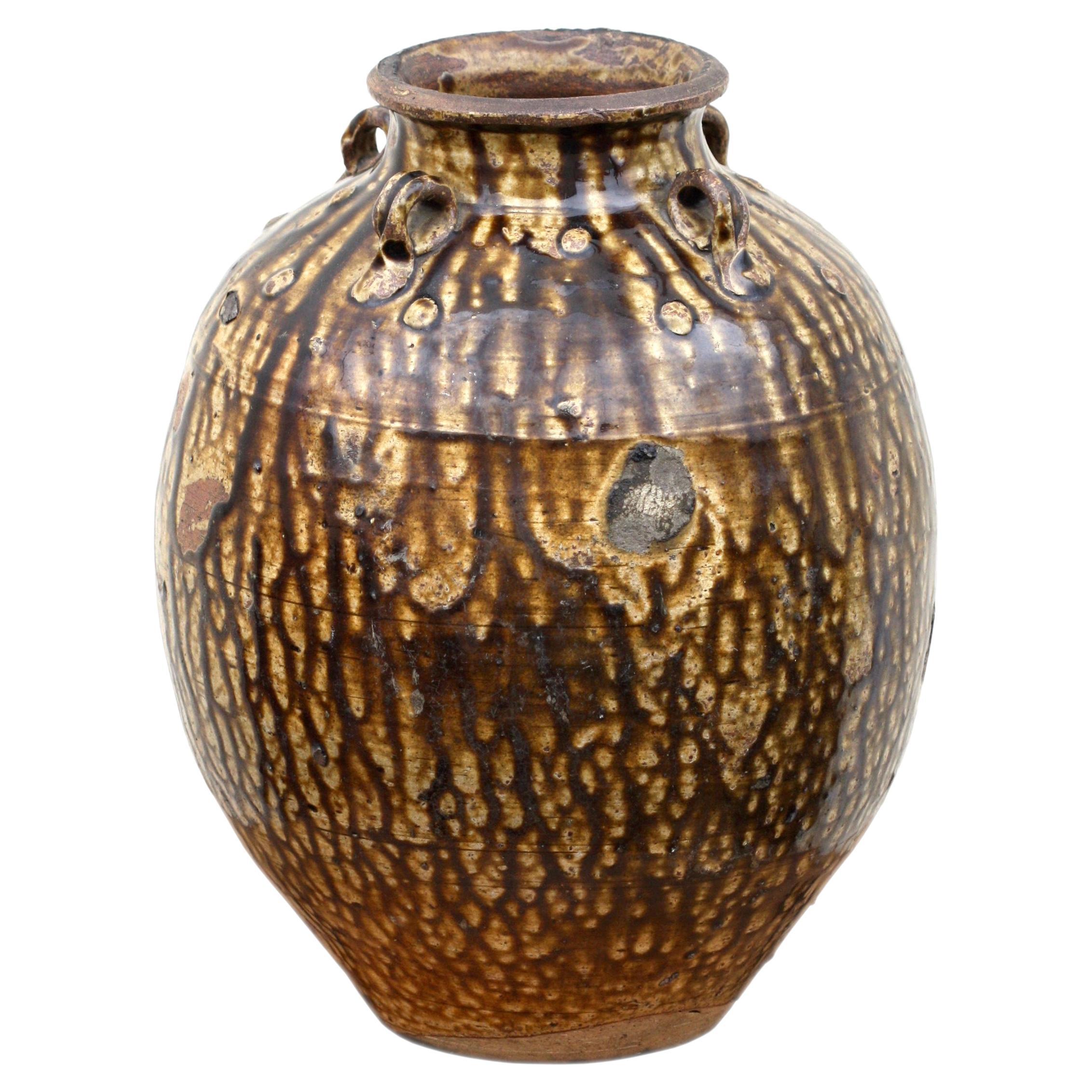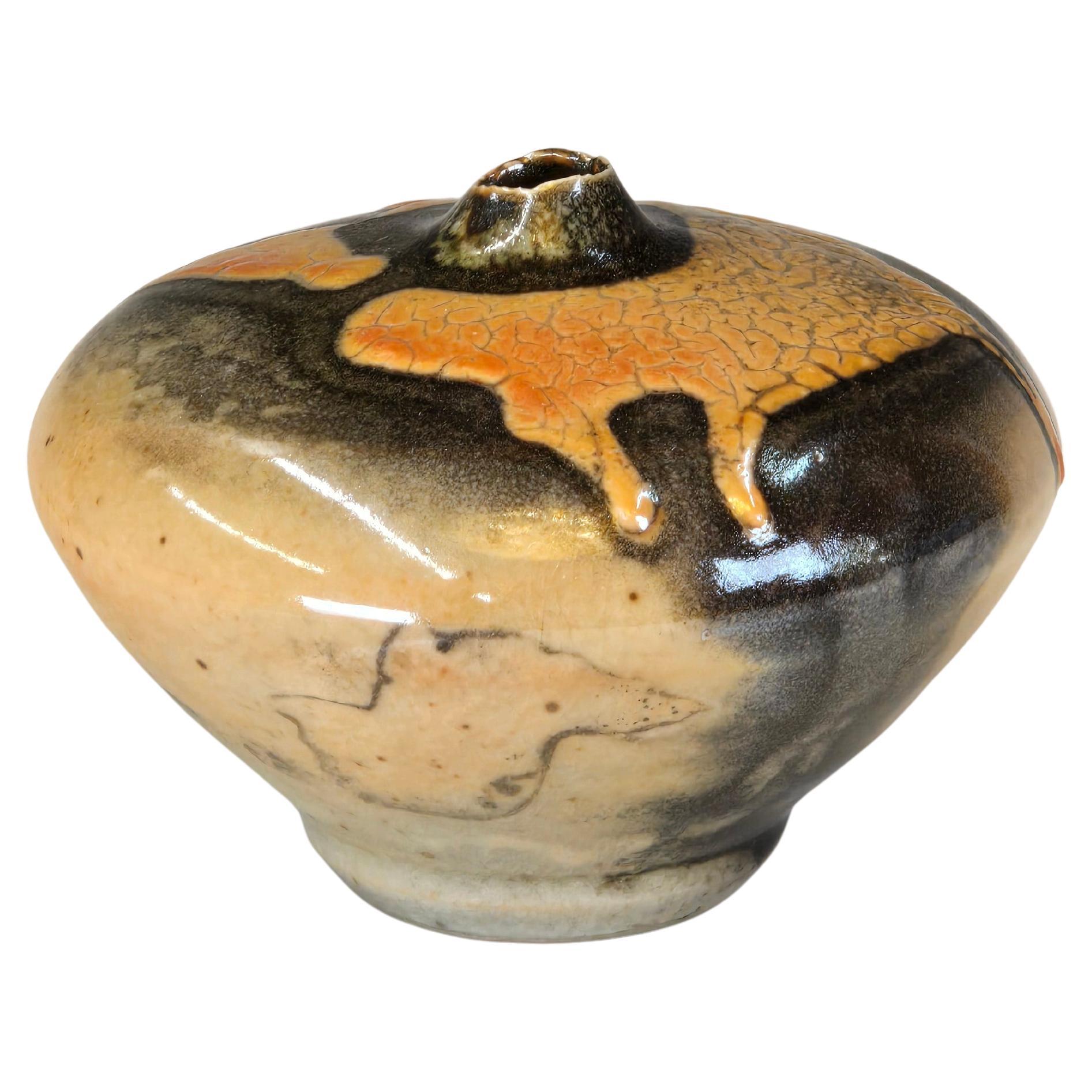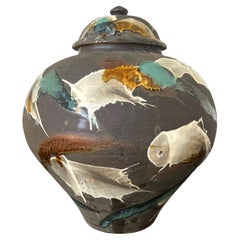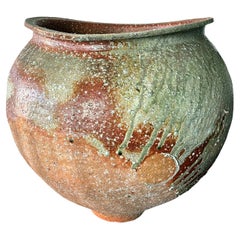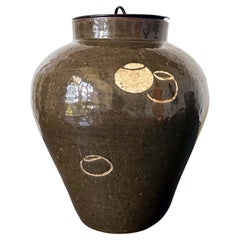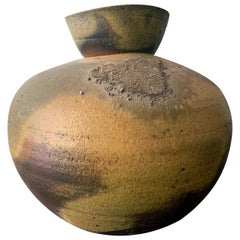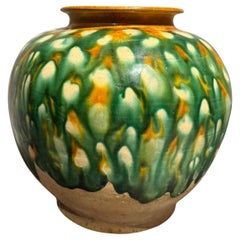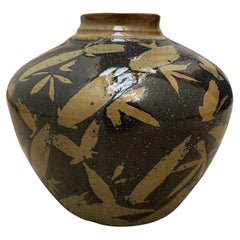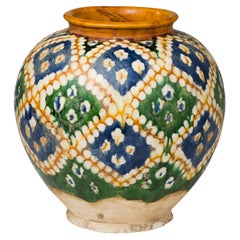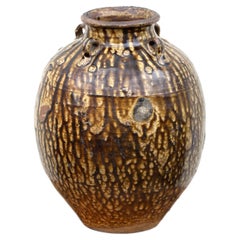Items Similar to Japanese Ceramic Jar with Expressive Glaze Onda Yaki
Want more images or videos?
Request additional images or videos from the seller
1 of 15
Japanese Ceramic Jar with Expressive Glaze Onda Yaki
$5,600
£4,281.50
€4,931.42
CA$7,847.32
A$8,760.79
CHF 4,590.52
MX$107,240.69
NOK 58,299.69
SEK 54,969.20
DKK 36,803.70
Shipping
Retrieving quote...The 1stDibs Promise:
Authenticity Guarantee,
Money-Back Guarantee,
24-Hour Cancellation
About the Item
A Japanese lidded ceramic jar from the kiln of Onda Yaki, circa 2007. The stoneware jar impresses the viewer with a robust bulbous form. and exuberantly splashed and dripped glaze in yellow and green on a contrasting ocher background. The visual effect is wonderful that it calls to mind the San-Cai from Chinese Tang dynasty, yet the application is akin to abstract painting on canvas. As a result, the jar has a distinctive aesthetic that appears both traditional and modern at the same time
Onda Yaki also spelled as Onta Yaki also spelled Onta, is a type of Japanese pottery produced in and around the village of Onta in Oita Prefecture in Kyushu Island. It was founded in 1705. Closely associated with Mingei folk art, Onda ware was inscribed by the national government in 1995 as an Intangible Cultural Property
Background from Pucker Gallery where the jar was exibited and purchased.
"In his search for true folk pottery, the Japanese philosopher Soetsu Yanagi (1889-1961) discovered the community of Onda Sarayama (Japanese for "Plate Mountain") on the island of Kyushu in Japan. Little has changed about the process and aesthetics of ceramic production in Onda since that time. Currently, ten of the fourteen families inhabiting the area participate in pottery production; the eldest son is the only person who is allowed to throw the pottery. This community works together using locally sourced clay to create iron-rich, functional pieces. There is a strong focus on slip decoration via brushwork, chattering, and dripping with a free and energetic approach."
Provenance: Pucker Gallery, Boston Collection of Frederick R. McBrien III Heritage, Dallas, Design, 29 September 2022, Lot 67117 Private California Collection
Exhibited: Onda Yaki: Japanese Folk Ceramics, 31 March - 22 April 2007, Pucker Gallery, Boston
Literature: Onda Yaki: Japanese Folk Ceramics, Pucker Gallery exhibition catalog, pg. 17, fig. ON963
- Creator:Onda Yaki (Maker)
- Dimensions:Height: 14 in (35.56 cm)Diameter: 10.5 in (26.67 cm)
- Style:Organic Modern (Of the Period)
- Materials and Techniques:Ceramic,Glazed
- Place of Origin:
- Period:
- Date of Manufacture:2007
- Condition:Wear consistent with age and use. Fine condition with only minor contact wear on the base as shown.
- Seller Location:Atlanta, GA
- Reference Number:1stDibs: LU945041737212
About the Seller
4.9
Platinum Seller
Premium sellers with a 4.7+ rating and 24-hour response times
Established in 2006
1stDibs seller since 2010
564 sales on 1stDibs
Typical response time: <1 hour
- ShippingRetrieving quote...Shipping from: Atlanta, GA
- Return Policy
Authenticity Guarantee
In the unlikely event there’s an issue with an item’s authenticity, contact us within 1 year for a full refund. DetailsMoney-Back Guarantee
If your item is not as described, is damaged in transit, or does not arrive, contact us within 7 days for a full refund. Details24-Hour Cancellation
You have a 24-hour grace period in which to reconsider your purchase, with no questions asked.Vetted Professional Sellers
Our world-class sellers must adhere to strict standards for service and quality, maintaining the integrity of our listings.Price-Match Guarantee
If you find that a seller listed the same item for a lower price elsewhere, we’ll match it.Trusted Global Delivery
Our best-in-class carrier network provides specialized shipping options worldwide, including custom delivery.More From This Seller
View AllLarge Japanese Contemporary Ceramic Jar from Onda Yaki Kiln
By Onda Yaki
Located in Atlanta, GA
A large Japanese lidded ceramic jar from the kiln of Onda Yaki, circa 2010. The stoneware jar impresses the viewer with a robust bulbous form. Its black body is nearly unglazed but exuberantly splashed with strokes of slip glazes of white, yellow and blue. The visual effect is wonderful that it appears traditional and contemporary at the same time. The tri-color glaze calls to mind the San-Cai from Chinese Tang dynasty, yet the application is akin to abstract painting on canvas.
Onda Yaki also spelled as Onta Yaki also spelled Onta, is a type of Japanese pottery produced in and around the village of Onta in Oita Prefecture in Kyushu Island. It was founded in 1705. Closely associated with Mingei folk art, Onda ware was inscribed by the national government in 1995 as an Intangible Cultural Property
Background from Pucker Gallery where the jar was exibited and purchased.
"In his search for true folk pottery, the Japanese philosopher Soetsu Yanagi...
Category
2010s Japanese Organic Modern Ceramics
Materials
Ceramic
Large Contemporary Ceramic Tsubo Jar by Kai Tsujimura
Located in Atlanta, GA
A massive stoneware tsubo floor jar created by Japanese contemporary ceramic artist Kai Tsujimura (1976-). The heavy jar with its impressive volume was made in the tradition of Iga ware with local coarse sandy clay that turned reddish after the firing. It took its shape from heavy medieval storage jars with a wide-open mouth. For a nearly identical form, see an Echizen jar from Heian period (794–1185) in the collection of MET (Accession Number: 1977.261). The surface showcases scattered white crystalized feldspars and a green vitrified ash glaze cascade down the body (known as biidoro in Japanese - after the Portuguese word for glass vidoro). These is a globular shape impressed on the jar. It is a signature practice of the Tsujimura potter family by stacking bowls between the pieces in the kiln during the firing, resulting in an accidental but iconic aethetic (Kai and Yui Tsujimura...
Category
2010s Japanese Organic Modern Ceramics
Materials
Stoneware
Japanese Ceramic Seto Tea Leaf Tsubo Jar Edo Period
Located in Atlanta, GA
A Japanese glazed ceramic jar with a lacquered wood lid circa 19th century of late Edo to early Meiji Period. The stoneware tsubo was used as a storage vessel for produce such as tea...
Category
Antique 19th Century Japanese Edo Ceramics
Materials
Ceramic
Wood-Fired Ceramic Jar Paul Chaleff
By Paul Chaleff
Located in Atlanta, GA
A large stoneware jar by Paul Chaleff (1947-) made in 1987 and was purchased directly from the artist's studio in New York. Wood fired ceramic vessel with h...
Category
Vintage 1980s American Modern Jars
Materials
Ceramic
Asian Flambe Studio Pottery Vase
By Kyoto Pottery
Located in Atlanta, GA
A garlic bottle vase in an archaic Chinese form, but likely Japanese in origin. Several circumventing grooves however, suggest a more modern age. It was done in a brilliant purple glaze over a robin egg blue background glaze. The bubbling and bursting effects during the firing renders the surface an artistic spotting effect. The color pallet recalls the Classic Jun Yao...
Category
Antique Late 19th Century Japanese Japonisme Ceramics
Materials
Ceramic
Japanese Ceramic Vase Mingei Style Hamada Shoji
By Hamada Shoji
Located in Atlanta, GA
A heavily potted stoneware vase in cylindrical form, decorated with abstract strokes in iron rust glaze (known as Persimmon Glaze in Japanese) on a black glazed background. The pattern suggests autumn grasses, and it was applied with free hands. The vase is attributed to Japanese potter Hamada Shoji...
Category
Late 20th Century Japanese Arts and Crafts Ceramics
Materials
Ceramic
You May Also Like
Chinese Tang Dynasty Style Sancai Glazed Ceramic Jar
Located in Stamford, CT
Chinese Tang Dynasty style Sancai glazed jar. This is a lovely example of Sancai glaze with the beautiful green, ocher and cream colors dripping down from the ocher rimand melding ov...
Category
Antique 19th Century Chinese Chinese Export Ceramics
Materials
Ceramic, Earthenware
Decorative Ceramic Vase with Asian Motif
Located in Chalk Hill, PA
Decorative Ceramic Vase featuring asian style motif. Signed on the bottom.
Category
20th Century Unknown Organic Modern Vases
Materials
Ceramic
A Rare Sancai-Glazed Pottery Jar, Tang Dynasty
Located in seoul, KR
The jar is of globular shape and is decorated to the body with a geometric design band of lozenge-shaped motifs in blue, green, ochre and cream below a plain ochre everted mouth rim,...
Category
Antique 15th Century and Earlier Hong Kong Tang Antiquities
Materials
Earthenware
$7,950 Sale Price
50% Off
A Chinese Mataban Stoneware Storage Jar
Located in West Palm Beach, FL
A Chinese Mataban Stoneware Storage Jar
18th century
The baluster body set at the shoulder with lug handles
brown glaze
Height 12.87 in
Catalogue note
The glaze is influenced by the...
Category
Antique 18th Century Antiquities
Materials
Stoneware
Japanese Studio Pottery Vase
Located in Kilmarnock, VA
A striking Japanese woodfired stoneware vase, compact in form yet powerful in presence. Decorated with gestural abstract expressionist brushstrokes, smoke shadows, and natural kiln e...
Category
Mid-20th Century Japanese Vases
Materials
Stoneware
Glazed Pottery Storage Jar
Located in Dallas, TX
This piece is a part of one-of-a-kind collection, Le Monde. French for “The World”, the Le Monde collection is made up of rare and hard to find pieces curated by Brendan from estate ...
Category
20th Century Organic Modern Jars
Materials
Pottery
More Ways To Browse
Lidded Ceramic
Kiln Japanese
Used Ceramic Kilns
Abstract Japanese Ceramics
Japanese Lidded Jar
Chinese Yellow Glaze
Dynasty Jar Glazed
Yellow Glazed Jars
Green Glazed Pottery Jar
Yellow Ware
Green Drip Glaze
Japanese Green Pottery
Green Jar Japan
Chinese Stoneware Jar
Drip Jar
Yellow Chinese Jar
Japanese Ceramics Mingei
Japanese Stoneware Plate
